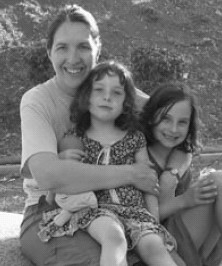By Joan DeMeyer, co-leader of API of St. Louis, Missouri
**Originally published in the Fall 2008 Growing Child issue of The Journal of API

My decision to send my children to public school was made with some trepidation. In my local API chapter, many of the parents planned to homeschool or send their kids to private schools. Even though I understood the rationale for other forms of education, they just weren’t possibilities for us at the time. For numerous personal and financial reasons, public school was our first choice.
Prepare for School as You Would for Childbirth
Before my oldest daughter started kindergarten, I read a lot of books about education. I read The Unschooling Handbook by Mary Griffith, several of Alfie Kohn’s books on education, and also found Gordon Neufeld’s Hold On to Your Kids to be very insightful. It was a bit like preparing for childbirth. I felt well-informed and ready to tackle any problems that might arise during her school-aged journey.
Staying Connected
When school started, it was not an easy adjustment, but after two or three weeks, my daughter was enjoying school, making friends, and learning all sorts of things. I stayed connected to her while she was at school through several means: I stopped by to eat lunch with her as often as I could, volunteered to chaperone field trips and work at school book fairs, served on PTA committees, became a Girl Scout leader, and joined a group of moms from her kindergarten class. I also encouraged her to invite friends over for play dates.
All of these activities enabled me to get to know the school environment, teachers, administration, her classmates, and their parents. This gave us lots to talk about at the end of each day and stay connected.
Confront Problems
There were some bumps along the way, but I dealt with one thing at a time. I spoke to the school principal and PTA president about several practices that I didn’t agree with, such as withholding recess as punishment for talking too loudly during lunch and offering candy or free pizza coupons as a reward in the classroom. I attended a school board meeting and spoke up about nutrition when they were preparing to switch food vendors to save money.
I wasn’t always successful at getting things changed, but in many cases, by speaking up, I learned that there were many other parents who agreed with me and that there were alternatives to going along with the status quo.
Promote AP
Along the way, I’ve had some interesting opportunities to share information about my parenting style with others. I’ve introduced Nonviolent Communication to several teachers and parents, shared my positive discipline approach with other parents, and made book recommendations to the school board and district administration.
Nonviolent Communication
Nonviolent Communication (NVC), also known as compassionate communication, is an approach to interpersonal relations that emphasizes compassion as the motivation for action rather than fear, guilt, blame, coercion, threat, or justification for punishment. Through NVC, people can create a quality of connection that gets everyone’s needs met through compassionate giving. NVC focuses on what we and others are observing, separate from our interpretations and judgments in order to connect our thoughts and feelings to underlying needs and values, such as protection, support, and love.
The Center for Nonviolent Communication is a global organization seeking to educate and support people in NVC. For more information,visit www.cnvc.org.
The Right Choice
Now, two years later, I am very happy with our decision to send our children to public school. My daughter really enjoys learning and has made a lot of close friends. She is doing well in school, and her teachers say wonderful things about her. I know there will be other issues that come up along the way, but I’m preparing myself to deal with them.
Some people might say it’s too much work to tackle issues in the public school system, but I can see the benefits of my involvement, not just for my children but for other children, as well. No matter what decisions you make about your child’s education, my advice is to stay involved, don’t be afraid to speak up, and make adjustments as necessary.
Parenting is a journey, and each phase of your child’s life brings new opportunities and challenges. As your children age, what they need from you changes, but the fact that they need you doesn’t.
One thought on “On Public School”